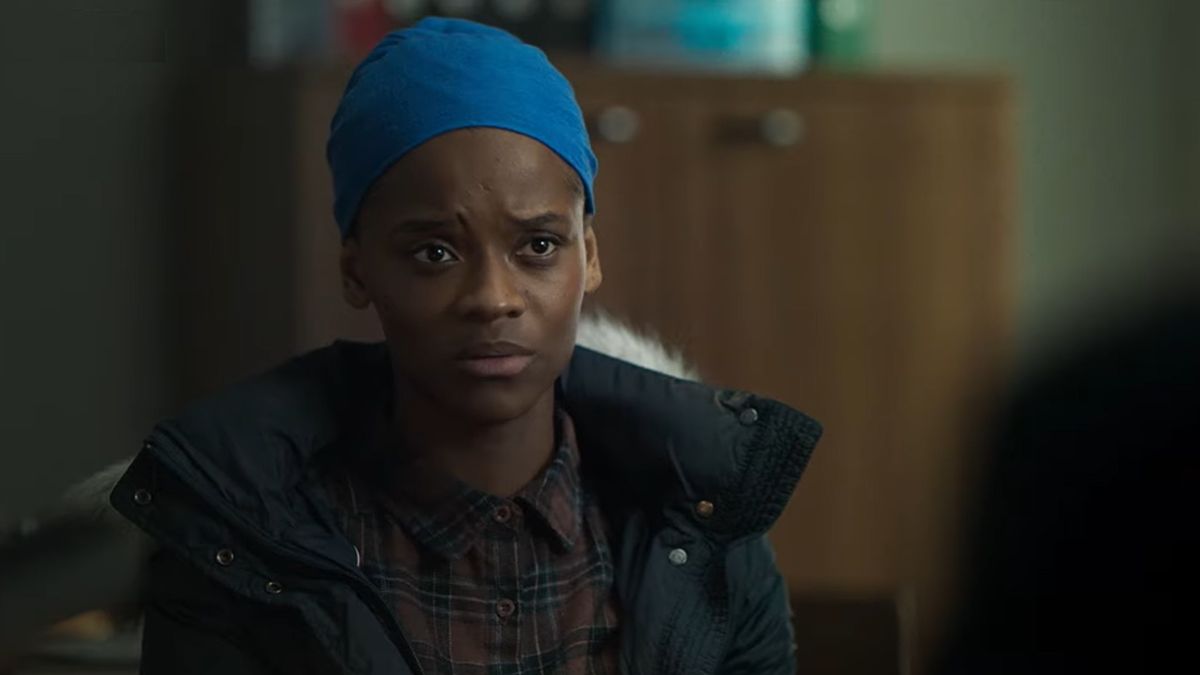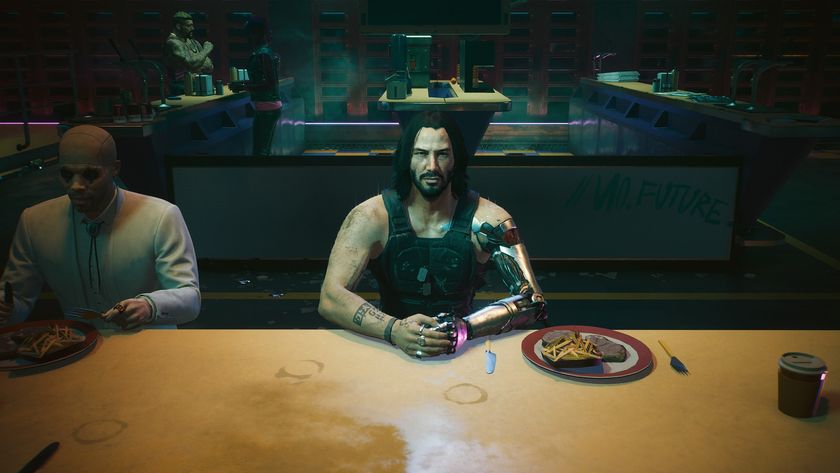
Letitia Wright's latest role couldn't be further away from Shuri, the tech-savvy Wakandan princess whose commanding and authoritative spirit made her Black Panther's biggest breakout. In Aisha, she plays a young Nigerian woman who's forced to flee to Ireland after suffering a terrible assault back home, and gets trapped inside the country's neglectful and corrupt immigration system. She is a powerless figure in a dreadful situation.
Written and directed by Frank Berry (Michael Inside), Aisha is a solemn, thought-provoking drama that sees Wright deliver some of her best work to date. The filmmaker penned the script having spent four years looking into the direct provision system, a controversial network that sees the Irish government provide asylum seekers with accommodation and small allowances, while essentially robbing them of their independence. When Wright came on board, she talked to refugees in a similar position to her character, Aisha, and the pair soon realized how important it was to change the movie's focus – rather than focusing on many characters, Wright's Aisha is on screen the entirety of the movie's 94-minute runtime. (The title even ended up changing partway through filming, from its initial 'Provision'). It's a technique that forces the audience to live in powerless Aisha's heartbreaking limbo.
"The challenge was definitely to be present, because I was on set every day. There wasn't a day that I missed," Wright sighs jokingly while talking with Total Film. "The challenge is just to allow yourself to be a vessel. I was able to let go of things that I may have held onto if I had had maybe, five days of filming, or a week of filming and then a break. I just had to be raw. There was no time for nonsense, I had to just zone in. You couldn't overthink, you just had to tell the truth. Myself and Frank chased that every single day."
In dialogue-heavy scenes, backgrounds are blurred to further push emphasis onto Aisha, particularly when she's being interviewed by her solicitor, or forced to keep reliving the horrific events that left her orphaned, as officials try to determine whether she can remain in Ireland indefinitely. "We didn't have different setups; a wide, medium, a close up," she says. "[Berry] wanted long takes. He wanted you to feel intimate with the character. That connected for me as an artist; you're taking the audience on a journey of someone who's waiting. We called it that, where you just sit in limbo. You're waiting for a yes, you're waiting for an opportunity for your life to move forward, and it's in the hands of someone else.
"We knew the tone of the film was going to be something that would force the audience to feel it in some sense. You can't feel it completely, because some people spent 10 years, eight years, six years… Kids were born and grew up into teenagers in the system. We wanted to use the cinematography and we wanted to use the script and the performances to take you on that journey of what it felt like to wait for a 'Yes'. It can feel like an eternity."

Aisha, the movie, commendably doesn't shy away from the bleak realities of its protagonist's situation – she's moved twice without warning, learns of an extended family member's death over the telephone, and faces mounting microaggressions on the daily – but Berry still finds ways to highlight the fleeting moments of warmth in Aisha's life. In between her shifts at a local hairdressing salon and laughing with her pals in her first set of dingy digs, Aisha strikes up a close friendship with sweet-natured, former prisoner Conor Healy, played by The Crown's Josh O'Connor. The duo's chemistry is palpable; so intimate and grounded that you'd almost think you're watching a documentary. Before long, Conor confesses to Aisha that he's developing romantic feelings for her, but she winds up rebuffing him, uncertain as to whether she's even got a future to involve him in.
"Conor brings an unexpected shift to Aisha's world, where she's focused on achieving something and she's focused on getting out of this hole, but there's this beautiful person that's there to support her and hold her hand through it, and she doesn't know how to accept that," Wright explains. "[Josh] is so generous. He's a beautiful artist. I love his approach to Conor; someone who's trying to change for the better, and someone that can connect with people on a human level. Someone that's not judgmental, you know? He really is a treat. Not only as an actor, but also as the character. Josh is what you see on screen, really."
Sign up for the Total Film Newsletter
Bringing all the latest movie news, features, and reviews to your inbox
Following on from her recent lead roles in Black Panther: Wakanda Forever and Aisha, Wright is set to front The Silent Twins, a drama based on real-life sisters June and Jennifer Gibbons. The movie, which examines the young womens' refusal to talk to anyone but each other, will mark her first credit as producer, prior to the release of her civil war drama Surrounded, where she'll play a female soldier who faces off against an outlaw gang after laying claim to a gold mine – and she's already on the lookout for her projects beyond those.
"I'm keen to do more of it," she says of getting more involved behind the camera. "I try to find stories that are meaningful, just like how I do in my acting career. I try to find projects that can impact people and make a positive contribution within society and within the film industry, or TV industry. I just want to go where the good work is and I want to produce the good work, too." Given her track record, Wright's future looks bright.
Aisha, a Sky Original, is in cinemas and on Sky Cinema now. For more, check out our review on Black Panther: Wakanda Forever, which is also led by Wright.
I am an Entertainment Writer here at 12DOVE, covering all things TV and film across our Total Film and SFX sections. Elsewhere, my words have been published by the likes of Digital Spy, SciFiNow, PinkNews, FANDOM, Radio Times, and Total Film magazine.
Most Popular








